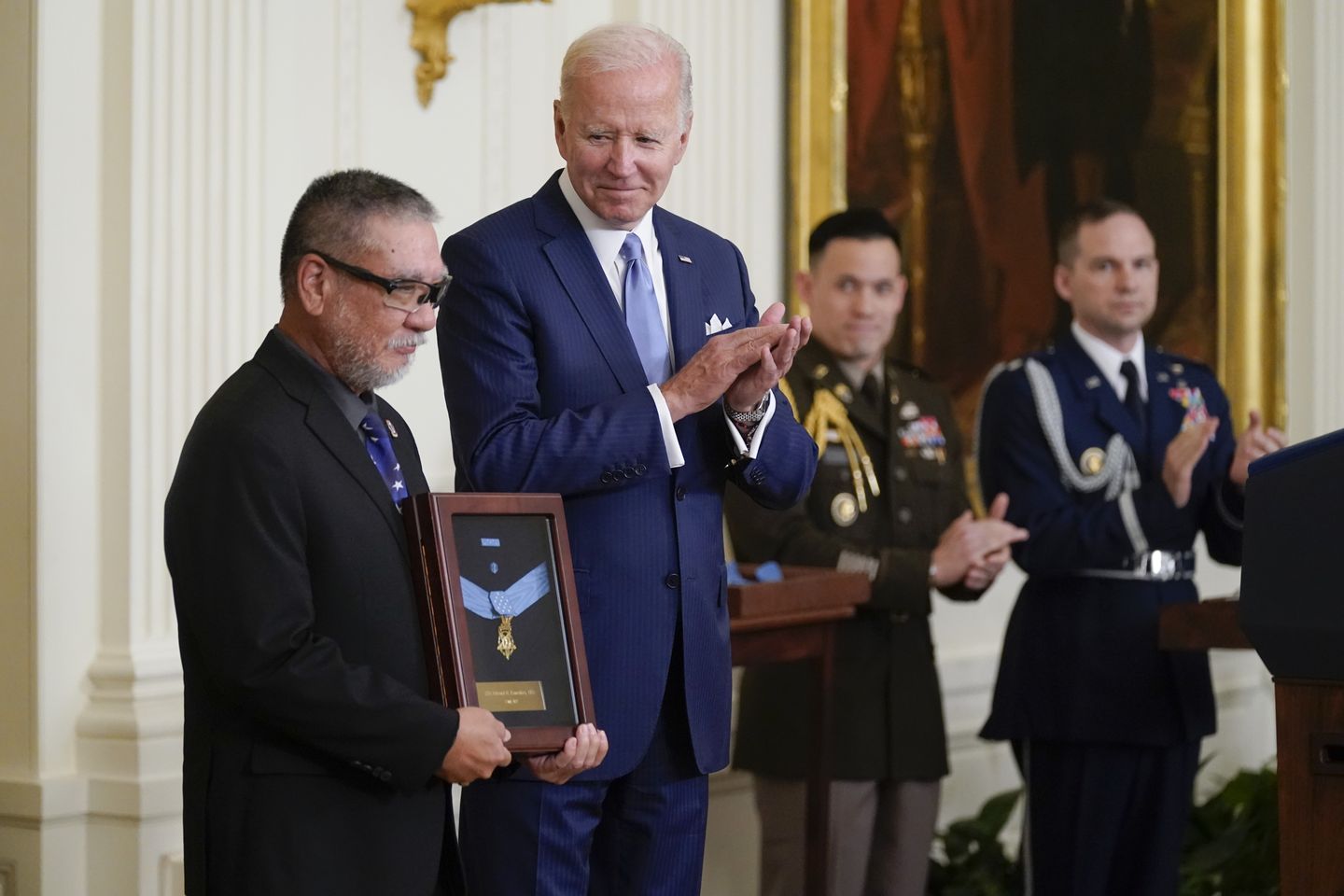

ANALYSIS:
President Biden on Tuesday awarded the Medal of Honor to four Army veterans for extraordinary acts of heroism during the Vietnam War.
The recipients — Staff Sgt. Edward N. Kaneshiro, Spc. 5th Class Dwight W. Birdwell, Spc. 5th Class Dennis M. Fujii and Major John J. Duffy — joined the small cadre of service members who have received the nation’s highest recognition of valor.
“Today we’re setting the record straight,” Mr. Biden said at a White House ceremony where he presented the medals decades after the soldiers distinguished themselves on the battlefield.
Staff Sgt. Edward N. Kaneshiro
Kaneshiro, who was killed in action on March 6, 1967, served as an infantry squad leader in the 1st Cavalry Division on December 1, 1966, when his unit was attacked by fortified enemy forces.
After a barrage of enemy gunfire, which killed a platoon leader, point man, and four others, Kaneshiro deployed his surviving soldiers to cover before single-handedly assaulting an enemy bunker and clearing 35 meters of enemy trenches to enable the U.S. forces to reorganize and successfully withdrawal from enemy territory.
Kaneshiro, the son of Japanese immigrants who was born and raised in Hawaii, continued to serve in Vietnam until he was killed by enemy gunfire months later.
“Today his memory lives on in the lives he saved, in the legend of his fearlessness, and in the hearts of the family he left behind,” Mr. Biden said.
Spc. 5th Class Dwight W. Birdwell
Spc. 5th Class Birdwell served with the 25th Infantry Division when his tank commander was incapacitated following an enemy assault on his unit on Jan. 31, 1968.
Under heavy enemy fire, Spc. 5th Class Birdwell moved his commander to safety before assuming control of the vehicle and delivering effective fire on the enemy force from an exposed position. After expending all available ammunition, Spc. 5th Class Birdwell dismounted the tank and retrieved two machine guns from a downed helicopter to continue laying down suppressive fire.
He sustained wounds to his face and torso when enemy fire hit his machine gun resulting in an explosion during the battle. Spc. 5th Class Birdwell refused evacuation and continued to engage the enemy. After receiving reinforcement, he then aided in the evacuation of others until he was ordered to seek attention for his wounds.
Spc. 5th Class Birdwell, a citizen of the Cherokee Nation, returned home to Oklahoma in December 1968, completed law school at the University of Oklahoma, and later served on the equivalent of the Cherokee Nation’s Supreme Court.
Spc. 5th Class Dennis M. Fujii
Spc. 5th Class Fujii was assigned as the crew chief of a helicopter ambulance in the 61st Medical Battalion during a rescue operation in Laos and Vietnam in February 1971.
After his helicopter crashed during an evacuation operation, Spc. 5th Class Fujii became pinned down by enemy fire and waived off a second helicopter that had landed to retrieve his fellow airmen.
Despite being injured himself, Spc. 5th Class Fujii remained as the lone American on the ground to treat the injuries of South Vietnamese through the following day as friendly helicopters remained unable to land amid heavy enemy fire.
Over several days, he called in American helicopter gunships to repel an enemy attack on his position and repeatedly exposed himself to hostile fire to secure the South Vietnamese position from enemy fire before being extracted from the battlefield by an American helicopter.
Major John J. Duffy
Maj. Duffy served with the 5th Special Forces Group and was assigned as an adviser to the 11th Airborne Battalion of the Republic of Vietnam in April 1972 when his base became surrounded by enemy forces.
Maj. Duffy, who was wounded amid enemy bombardment, refused evacuation and personally ensured the allied forces were moved to relative safety and distributed ammunition to those remaining to defend their position.
Despite receiving indirect fire, ambushes and ground assaults from the enemy over two days, Maj. Duffy remained in his position and led the partner forces to an evacuation area amid continued pursuit by the enemy.
Once he had reached the exfiltration site, he directed gunship fire on enemy positions, enabling helicopters to land.
After ensuring all evacuees were onboard, Maj. Duffy boarded a helicopter where he assisted the wounded aboard and administered aid to a door gunner that had been wounded during the evacuation.
“There’s been a long journey to this day for those heroes and their families,” Mr. Biden said. “More than 50 years have passed. But time has not diminished their astonishing bravery, their selflessness in putting the lives of others ahead of their own, and the gratitude that we as a nation owe them.”
